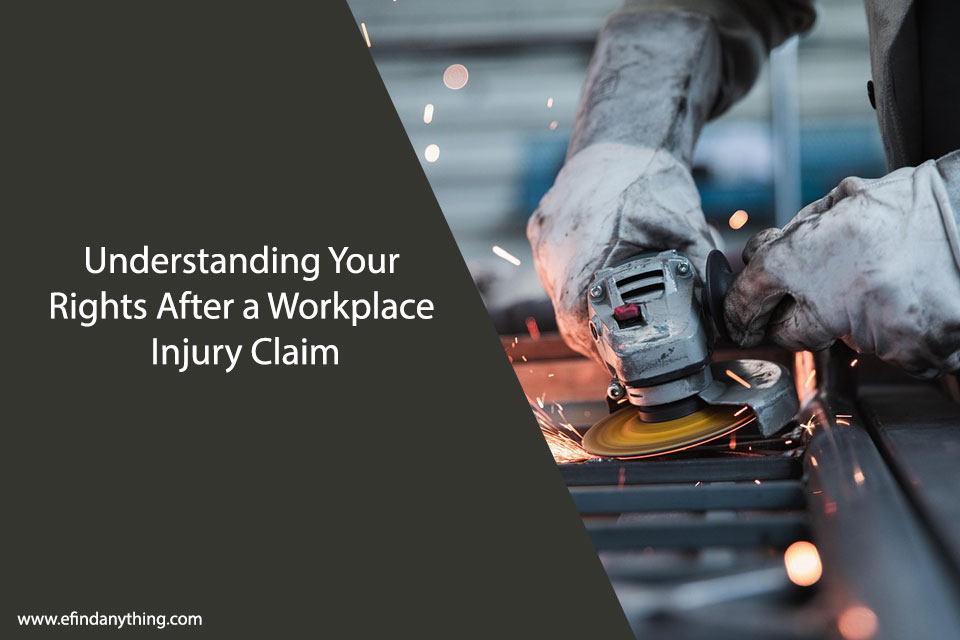
Got hurt at work?
Every year, 2.6 million workplace injuries are reported across the United States. That’s 2.6 million workers dealing with medical bills, lost wages, and a complex legal system they never expected to face.
Most injured workers have no idea what they’re entitled to. They don’t know their rights, they don’t understand the claims process, and they definitely don’t realize how much money they could be leaving on the table.
Without knowing your rights, you’re flying blind.
That’s why this guide will help you understand exactly what you’re entitled to after a workplace injury. Knowing your rights can make the difference between getting the compensation you deserve… and getting nothing at all.
What you’ll discover:
- Your Basic Rights After a Workplace Injury
- Understanding Workers’ Compensation Benefits
- When You Can Sue Your Employer
- How to Protect Your Rights During the Claims Process
Your Basic Rights After a Workplace Injury
You have rights the moment you get injured at work. And I’m talking about rights that are protected by law — not just company policies that can change on a whim.
Here are your fundamental rights:
- Right to immediate medical care — You can seek emergency treatment without waiting for approval
- Right to choose your treating physician (in most states)
- Right to receive wage replacement benefits while you recover
- Right to file a workers’ compensation claim without fear of retaliation
- Right to appeal denied claims through proper legal channels
These rights exist whether your employer likes it or not. They can’t fire you for filing a claim, they can’t force you to use a specific doctor, and they definitely can’t make you pay for work-related medical expenses.
The problem? Most injured workers don’t know these rights exist until it’s too late. That’s why it’s crucial to contact a law firm immediately after a workplace injury to ensure your rights are protected from day one.
Understanding Workers’ Compensation Benefits
Workers’ compensation isn’t just about covering your medical bills. It’s actually a comprehensive system designed to protect you financially while you recover from your injury.
Here’s what you’re entitled to:
Medical Benefits
Your employer (or their insurance company) must pay for:
- Emergency room visits
- Doctor appointments
- Prescription medications
- Physical therapy
- Surgical procedures
- Medical equipment and supplies
They have to pay for ALL reasonable and necessary medical treatment related to your injury. That means if you need ongoing therapy, specialized equipment, or even reconstructive surgery — they’re on the hook for it.
Wage Replacement Benefits
This is where things get really important. Workers’ compensation provides different types of wage replacement depending on your situation:
Temporary Total Disability (TTD): When you can’t work at all while recovering. You’ll typically receive about 2/3 of your average weekly wage.
Temporary Partial Disability (TPD): When you can work but not at full capacity. You’ll receive partial wage replacement.
Permanent Partial Disability (PPD): When you have a permanent impairment that affects your earning capacity.
Permanent Total Disability (PTD): When you’re permanently unable to work. This provides ongoing benefits for life.
The average workers’ compensation claim costs $44,179 according to recent data from the National Council on Compensation Insurance. That’s a significant amount of money that could help you and your family during a difficult time.
When You Can Sue Your Employer
Here’s something that surprises a lot of people…
Workers’ compensation is usually your only remedy against your employer. That means you typically can’t sue them for negligence, even if they caused your injury through careless behavior.
But there are exceptions:
- Intentional acts: If your employer deliberately caused your injury
- Gross negligence: When their conduct was so reckless it goes beyond normal negligence
- Lack of workers’ comp coverage: If your employer doesn’t carry required insurance
- Dual capacity doctrine: When your employer acts in a different capacity (like as a product manufacturer)
However, you might be able to sue third parties who contributed to your injury. This could include:
- Equipment manufacturers
- Contractors working on your job site
- Property owners
- Other drivers (in vehicle accidents)
Third-party lawsuits can be valuable because they allow you to recover damages that workers’ compensation doesn’t cover — like pain and suffering, full lost wages, and punitive damages.
How to Protect Your Rights During the Claims Process
The claims process can be tricky. Insurance companies aren’t exactly known for making things easy, and they definitely don’t want to pay out more than they have to.
Here’s how to protect yourself:
Report Your Injury Immediately
Don’t wait. Most states require you to report workplace injuries within a specific timeframe (usually 30 days). Missing this deadline could jeopardize your entire claim.
Get Medical Attention
Even if your injury seems minor, get it checked out. Some injuries don’t show symptoms immediately, and having medical documentation from day one is crucial for your claim.
Keep Detailed Records
Document everything:
- How the injury occurred
- Witnesses who saw the accident
- Medical treatments received
- Days missed from work
- Communications with your employer and insurance company
Don’t Sign Anything Without Understanding It
Insurance companies might ask you to sign forms or settlements. Don’t do it without having someone review the documents first. Once you sign, you might be giving up important rights.
Be Careful with Recorded Statements
Insurance adjusters might ask for recorded statements. While you generally have to cooperate, be careful about what you say. Stick to the facts and don’t speculate about fault or the extent of your injuries.
Getting the Legal Help You Need
Workplace injury claims can get complicated fast. Recent data shows that 13% fewer severe injuries were reported in 2024, but that doesn’t mean the claims process has gotten any easier.
When should you contact a law firm? The answer is simple: as soon as possible after your injury.
A personal injury law firm can help you:
- Navigate the complex workers’ compensation system
- Ensure you receive all benefits you’re entitled to
- Investigate potential third-party claims
- Appeal denied claims
- Negotiate fair settlements
- Represent you in hearings
Don’t make the mistake of thinking you can handle everything on your own. The workers’ compensation system is designed to be complex, and insurance companies have teams of lawyers working to minimize your claim.
The Cost of Workplace Injuries
The financial impact of workplace injuries goes far beyond medical bills. When you’re hurt at work, you’re not just dealing with physical pain — you’re facing a potential financial crisis.
Consider this: workplace fatalities occurred every 99 minutes in 2023. While death is the most extreme outcome, even non-fatal injuries can devastate your finances.
Lost wages, medical expenses, and long-term disability costs can quickly add up. That’s why it’s so important to understand your rights and make sure you’re getting every benefit you deserve.
Don’t Wait to Act
Time is critical when it comes to workplace injury claims. Every day you wait is a day that evidence could disappear, witnesses could forget important details, and your rights could be compromised.
The workers’ compensation system might seem overwhelming, but you don’t have to navigate it alone. With the right legal representation, you can focus on healing while someone else fights for your rights.
Wrapping It Up
Understanding your rights after a workplace injury is crucial for protecting your financial future and ensuring you get the compensation you deserve. The workers’ compensation system provides important benefits, but it’s not always easy to navigate on your own.
The key points to remember:
- You have specific rights that are protected by law
- Workers’ compensation covers medical expenses and wage replacement
- You might have additional legal options beyond workers’ compensation
- Documentation and timing are critical for a successful claim
- Legal representation can make a significant difference in your outcome
Don’t let a workplace injury derail your life. Know your rights, understand your options, and get the help you need to secure the compensation you deserve.
